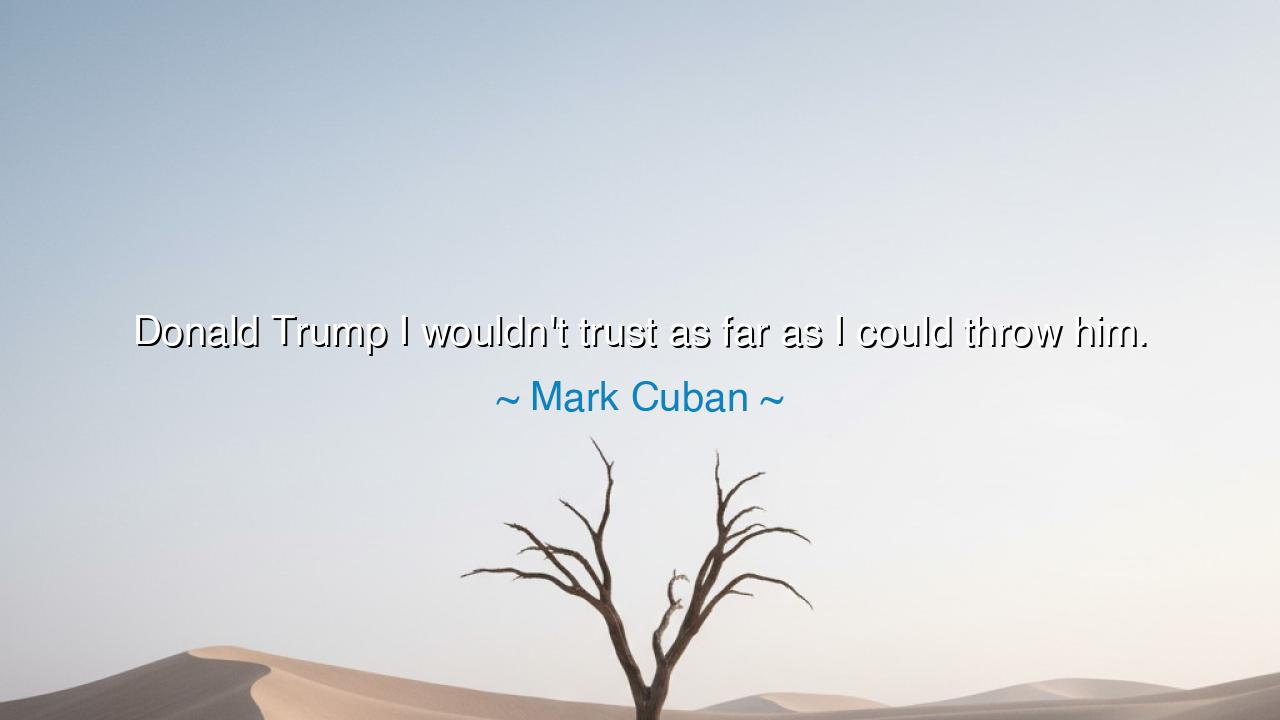
Donald Trump I wouldn't trust as far as I could throw him.






Hear, O seeker of truth, the words once spoken by Mark Cuban, sharp as a sword and plain as fire: “Donald Trump I wouldn’t trust as far as I could throw him.” Though uttered in the spirit of rivalry and caution, these words carry the ancient weight of wisdom: beware of men whose words soar like eagles but whose hearts anchor in self-interest. For trust, that most sacred bond between one soul and another, is not to be given lightly, nor squandered on those who wield deception as a tool of power.
The saying itself springs from an old idiom, born of the people’s tongue: to say one would not trust a man “as far as he could be thrown” is to say that trust is impossible, for the distance is but a mere arm’s length. It is a metaphor of human strength measured against the burden of another’s reliability. Thus, Cuban, in casting forth this phrase, drew upon the long river of common speech, sharpening it with the name of one who inspires both fierce loyalty and fiery doubt. The ancients, too, would understand this proverb, for they often bound trust to weight: the heavier the burden, the harder to carry; the more dubious the man, the less distance his trust can travel.
History abounds with men of charisma who won the ears of multitudes but could not win the deeper currency of trust. Consider Alcibiades, the Athenian, whose brilliance in speech and strategy dazzled his people. Yet his loyalty was ever-shifting, his ambitions ever restless. Athens placed her trust in him, and he betrayed her, fleeing to Sparta, then Persia, bending always to the winds of advantage. Like Trump in Cuban’s eyes, Alcibiades embodied the peril of entrusting power to a man whose first allegiance was not to truth, nor to people, but to himself.
Let us also recall the tale of Richard Nixon, whose cunning hand secured power but whose deceit unraveled his reign. Many trusted him as a statesman, but when the tapes of Watergate revealed the hidden face beneath the mask, the nation recoiled. Here is the lesson Cuban’s words point toward: when a leader trades in half-truths, in boast, and in manipulation, trust crumbles like a fortress built on sand. The breach is not sudden, but inevitable.
Yet Cuban’s saying is not only about one man, nor one moment; it is a lamp for all who would judge character. It reminds us that trust must be earned through consistency, through truth tested over time, through deeds that align with words. To place faith blindly in the powerful is to place gold upon a gambler’s table. A wise man measures not only what is said, but what is done; not only what is promised, but what is delivered.
Therefore, O listener, take this counsel into your own life. Do not be dazzled by the loudest voice, nor seduced by the richest hand. Test the weight of a person’s honor before you entrust them with your treasure, your loyalty, or your future. Ask yourself: has this one spoken truth when it cost them dearly? Have they stood firm when the winds of gain blew against them? If not, then trust them not, no matter how brightly they shine.
Practical wisdom follows: in business, let contracts guard your dealings; in friendship, let time test your bond; in politics, let discernment guide your vote, for the truest leader is not the one who speaks most grandly, but the one who acts most faithfully. Do not be deceived by pageantry or wealth. Place your trust, like a seed, only in soil proven fertile by honesty and courage.
For in the end, Cuban’s sharp proverb is a call to vigilance: trust is the rarest coin of all. Spend it wisely, guard it fiercely, and give it only to those whose lives prove worthy. And remember always: the strength of a people is not measured by the power of their rulers, but by the wisdom of whom they choose to trust.






AAdministratorAdministrator
Welcome, honored guests. Please leave a comment, we will respond soon